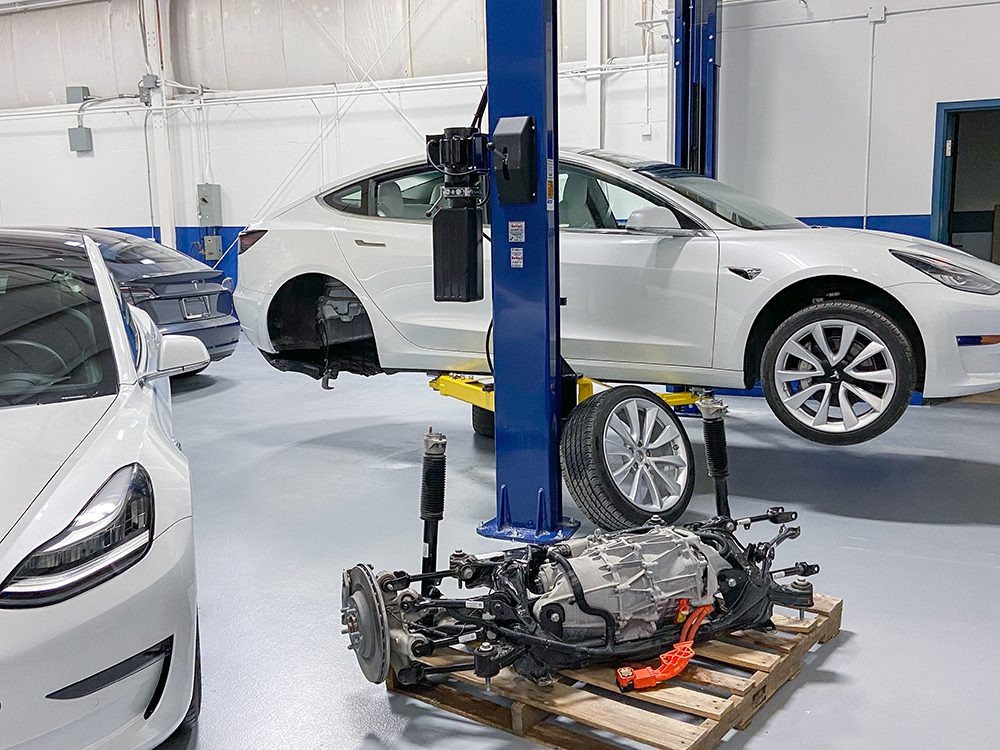While electric vehicles have gradually been gaining popularity across Canada, supply has largely kept the Maritime provinces behind the pack. A new and unique multiservice Dartmouth start-up is poised to change all that.
By Carter Hammett
It’s hard to believe that less than decade ago electric vehicle enthusiasts felt they only had two mainstream choices: The Nissan Leaf or the Mitsubishi MiEV were about it, man. Sure, the Tesla Model S was kicking around but who could afford that paragon of virtue? You were lucky if your mainstream choice didn’t conk out after 150 km and let’s not even get started on that debate about the charging network.

Times sure have changed.
And today that unaffordable Tesla might be just within reach thanks to a new Dartmouth start-up.
At least that’s what the good folks behind Dartmouth-based All EV Canada (allev.ca) promise. With some vehicles’ price points available in the 20K range or less, the fledgling business has been generating an awful lot of buzz. In part, that’s because the multiservice dealership—the first of its kind in Atlantic Canada—is restoring then reselling “lightly damaged” EVs at reduced prices, making these vehicles—desired, but financially out of reach for many Atlantic residents—accessible.
“Previously loved”
The business also has the distinction of being the first major EV service centre to open in Atlantic Canada that isn’t run by an automaker.
And while the business features its share of Volts and Bolts, Leafs and Prii (Prius), the star of the show up for grabs is indeed Tesla, says CEO Jeff Farwell.
“Telsa is one of the pure EV companies,” he says. “Their technology is further ahead than anyone else’s and they’re in constant demand.”
The vehicles are acquired mostly through auctions, private owners and insurance companies, although All EV Canada maintains relationships with dealers across the country.
Often, the damage is limited to something relatively minor like a fractured bumper or perhaps, a broken door handle.
“When something is damaged, it’s generally easy to repair,” says Farwell. “If it’s too damaged, the vehicle’s used for parts.”
“We buy used EVs from auctions that may be slightly damaged,” concurs All EV Canada’s vice president Dave Giles. “We bring them here and sell them as used electric vehicles.”
Other cars are damaged, either by accident or theft, and may require more work. That work is conducted out of a state-of-the-art facility. “We have the parts here and we can alleviate the buyer’s fear,” says Giles.
One example he cites is that of a 2019 Model 3 Tesla that arrived in the shop with damage to the front bumper, left fender and broken headlights among others. After performing an inspection and reviewing procedures, a refurbished car like that could drop in price from the original price point of $60,000.00 now selling in the $42 – 40,000.00 range.
“That’s a great deal” says Giles.
Electric vehicles are often priced higher than gas-powered vehicles. So, in places absent from provincial purchase incentives like Nova Scotia, considering the purchase of a “previously-loved” EV begins to make sense, especially as the market begins to assume more prominence.
Training the Trainers
But if you thought sales of used vehicles were it for this business, take a second look. The service offers retrofits from gas-to-electric, collaborates on research projects and even offers parts for electric vehicles.
“People have a lot of apprehension when it comes to buying electric vehicles,” says Farwell. “They’re asking themselves questions about cost, maintenance and a host of other concerns.
“There’s a steep learning curve and it’s nice to appreciate that,” he says. “We are the EV specialists in our area. If buyers decide they want to purchase something in our area that’s great. People need to feel good about their purchase.”
In addition to educating the general public about their purchases, All EV recognizes that front line workers and first responders require education too, as the shift towards electric becomes “the new normal.”
Chief among these is a First Responder Safety Awareness Program, established early on in the game. Utilizing a range of damaged vehicles from EV’s inventory, paramedics, firefighters and other emergency service workers receive hands-on training while learning how to safely address the safety protocols and potential electrical hazards posed by electric vehicles damaged in crashes.
“First responders are the ones in the deal,” says Giles. “We want to make sure they’re protected when they’re handling high voltage systems,” he says.
Participants look at vehicle components and what they do. Giles says learners even get to drive Teslas so they become familiar with these cars.
Perhaps most importantly participants learn how cut specific cables that de-power the vehicle. “The hands-on component gives them the confidence to deal with extrication or fire situations,” says Giles. “It’s a pretty intense experience. They’re not working through a PowerPoint presentation….it’s all hands-on.”
The end result, is that first responders may just feel confident enough to save lives.
The involvement with education doesn’t end there. Currently, All EV is developing a curriculum to provide certified car mechanics with the training necessary for handling electric vehicles safely.
Smart parts

Much like the human body, cars need to be looked at holistically so the question of what to do with parts becomes a consideration.
When vehicles have been severely damaged, sometimes the vehicle can’t be resold. When that happens the parts still intact are salvaged and resold elsewhere. Selling those parts has turned into something of a global enterprise, with demand coming from around the world via All EV’s online marketplace.
Other parts are used on fixing vehicles that have only sustained minor damage. “We’re using the entire car so nothing goes to waste,” says Farwell.
Humble beginnings
With all that flurry of activity it’s easy to see that All EV’s partners have positioned themselves to offer something unique in the world of electric vehicles within Atlantic Canada. But the love affair with all things electric goes back almost two decades when Giles recalls being exposed to his first hybrid vehicle back in 2003 or 4.
“After doing some hybrid training I rented one—they were hard to get in those days—and just brought it home and tore it apart and took pictures.”
He was hooked.
Flash forward several years later to 2011 and Giles, then teaching at NSCC, was recruited to work on a successful and innovative braking project for some Harbour Hoppers that were part of a tour company where Jeff Farwell was a partner. The two became friends and stayed in touch. Years later as Farwell, running a successful tourism company, started to feel the yearning to stretch his horizons and developed itchy feet. Giles, also feeling a need to change direction in his personal life, began talking about an idea he had for a different kind of business.

Like many others Farwell was not an early adopter of EV, but he admired the deliverables it produced as well as the environmental benefits. More than that, he perceived a viable business opportunity and the chance to create “something out of nothing.” Together with third partner Jeremie Bernardin it wasn’t long before the concept became a reality.
Dave Giles estimates that combined EV sales tally around 800 across the Atlantic provinces. A recent Halifax Regional Municipality staff report predicted a quarter of all cars in Nova Scotia could be electric by 2040.
That prediction seems to be on point as sales continue to grow across the country. As Q3 2019, combined sales of EVs, battery electric vehicles (BEVs), plug-in hybrids (PHEVs) along with some hydrogen-fuel-cell vehicles accounted for about 3.5 per cent of all passenger vehicles sales in Canada.
Electric Mobility Canada states that that represents a 2.2 per cent increase over 2018. Buoyed by a federal rebate introduced in 2019 that offers up to $5,000, over 43,000 EVs and PHEVs were sold. By 2025, Ottawa hopes EVs will count for 10 per cent of all vehicle sales.
The most popular plug-in car is, unsurprisingly, the Tesla Model 3. This is followed the Toyota Prius Prime with the Mitsubishi Outlander PHEV rounding out the top 3 spots.
As of third quarter in 2019, there were over 136,000 EVs overall on Canadian roads. Compare this to 2014, when a mere 10,000 vehicles were on the road, and it’s easy to see how the concept is catching on with Canadians.
The uninitiated might want to consider that a recent BC Hydro survey found that charging a BEV in British Columbia is roughly equal to about 25 cents a litre, thereby saving big bucks on fuel.
Still not convinced? EVs have emerged with more elegant design and entertainment features than ever before, and a fully-charged unit will easily travel between 300-to-400 km on a full charge.
E-Trucks have been gradually increasing their presence on national roads as well. With a lot of us driving SUVs and trucks, expect to see models from Tesla, GM and Ford on the road by 2021.
Unfortunately EVs have been slightly slower to take off in the Atlantic region. Dealerships need a license to sell EVs, and that involves investment in specialized tools, training staff and hiring mechanics. Dealerships simply aren’t willing to make that investment .
The lion’s share of new EVs are sold in Ontario, BC and Quebec, with the latter two provinces establishing zero emissions vehicle mandates (ZEV). Currently none of the Atlantic provinces offer anything similar. A ZEV establishes targets on vehicle manufacturers on the quantity of cars that need to be electric. This in turn leads manufacturers to establish priority planning for supplying EVs to the provinces. At present no plans appear to be forthcoming for the Atlantic region on either the provincial or the federal side…
Almost makes you want to consider purchasing second hand…
“We may be considered second-hand but we don’t consider ourselves that,” says Farwell. “We’re just focusing on our plan and where we go from here. We’re learning the business as we do it, and not adapting to competitors’ models.”
“We’re capable of doing whatever needs to be done,” says Dave Giles. “We can convert, repair or sell. We’re sending parts out all over Canada, and even sending parts to Russia and Ukraine.
And as if all that weren’t enough the fledgling company continues to see how far its reach extends with projects ranging from partnering with Dalhousie university to explore electric conversion for racing vehicles to developing a prototype for a new type of amphibious vehicle.
“I really think we have something unique. Our back shop is fully equipped,” says Giles. We try to give an experience to someone coming here. We see value in doing something that no one else is doing.”
Canadian Electric Car Fast Facts
- There are more than 42,000 electric cars on the road in Canada and growing
- Provincial incentives in British Columbia and Québec can save you up to $8,000 off your vehicle purchase and $750 off your home charging station
- Driving an electric car can save you between $1,500-$2,000 per year on fuel and maintenance
- Canada’s electricity is clean with the majority of our power coming from hydro and nuclear
- Driving an electric car can reduce your vehicle’s emissions by as much as 90%
- Canada has more than 5,000 public charging stations, 500 of which are Level 3 fast chargers
- There are 36 models available for sale in Canada with more on the way
-Source: https://www .plugndrive.ca/electric-vehicle-advantage/
RESOURCES

